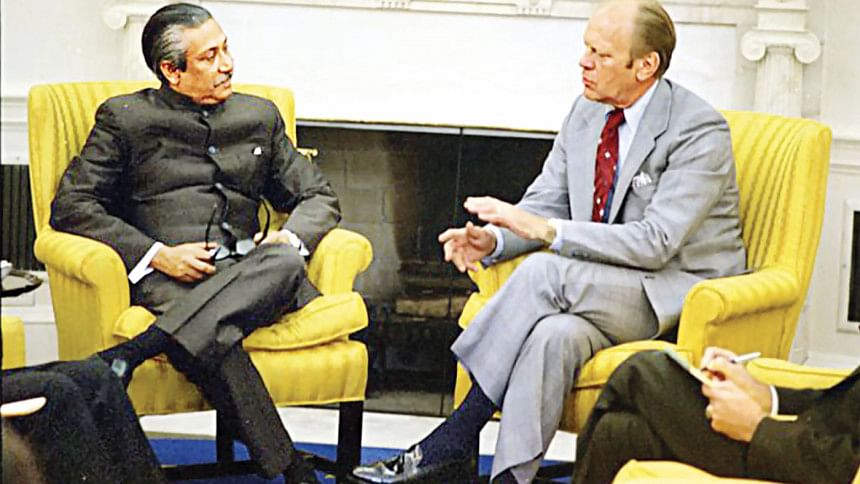Sheikh Mujib- The Architect of Bangladesh’s Foreign Relations

The disintegration of the Soviet Union and Yugoslavia has now familiarized the world with the emergence of independent ethnic states chipped out of the mother country. But the birth of Bangladesh in the early seventies as an independent and sovereign state breaking away from Pakistan was not readily appreciated internationally although as our independence struggle progressed sympathy for our cause snowballed. One may be tempted to make the point that Pakistan itself was a breakaway country, when in 1947, it was created as a result of tripartite negotiations with the Congress, the Muslim League and the British Government. Pakistan, though a breakaway country, was however not born, as Bangladesh was, through the barrel of the gun. The Biafra war in Nigeria, in the sixties, was hardly a precedent for Bangladesh, for it had failed; and as in love, war and politics nothing fails like failure. Bangladesh therefore may be viewed as a lone forerunner of the ethnic states that have appeared on the world map in recent years.
Bangladesh's birth in the seventies occurred amidst an unfavourable political and economic international setting. The cold war was on, with all attendant complexities for a new-born country. Then too, the sudden rise in oil prices had created a difficult and uncertain economic situation. One of the superpowers, the United States, was then busy knocking at China's door and both these countries must have looked upon our independence struggle, as an ill-timed distraction, particularly when Yahya Khan had (not unlike Nero) chosen to play on the flute of US-China understanding, notwithstanding the fact that his own house was on fire.
To make matters worse for Bangladesh, Bangabandhu Sheikh Mujibur Rahman was in Pakistan custody, when the war was won on December 16, 1971, and most of the world waited and watched as Bangladesh commenced its quest for recognition. Sheikh Mujib's return to Bangladesh on January 10, 1971 eased the situation somewhat but did not, automatically, cause a spare of recognitions. Securing international recognition quickly and obtaining membership of the international agencies were therefore among the major challenges that Sheikh Mujib's Government faced.
Bangabandhu then took three steps that were to have a bearing on Bangladesh's rapidly gaining acceptance in the comity of nations. First and foremost was the withdrawal of Indian troops from Bangladesh. Sheikh Mujib allayed the fears of his countrymen by declaring on the very day of his return to Dhaka from Islamabad via the somewhat circuitous but safe route of London and Delhi, that the Indian troops would leave Bangladesh so wished. In February, 1972, after his meeting with Madame Gandhi in Calcutta, the date of withdrawal of the Indian troops was announced and on March 12, 1972 the last of the Indian contingents left Dhaka. This, not only reassured the Bangladeshis, but also blunted the edge of the well-orchestrated propaganda, that Bangladesh was India's creation. It was then largely realised that though at that given point of time India's foreign policy thrusts and Bangladesh's national aspirations had coincided, it did not, in any way, negate the quality of Bangladesh's independence.
Second, the constructive and positive attitude that Bangabandhu took towards developing relations with Pakistan "Let by gones be by gones" was the dominant tenor of his attitude towards Pakistan, although understandably it was not always totally devoid of bitterness. But on the whole, the responsible and mature attitude that Bangladesh displayed at the tripartite Indo-Pakistan and Bangladesh talks helped hasten the process of normalization. Zulfiqur Ali Bhutto even paid a visit to Bangladesh in 1974, when Bangladeshis welcomed him displaying a "forgive and forget" attitude. Economically those were very difficult days for Bangladesh. Bhutto misread our mood, and viewed our eagerness to negotiate outstanding issues, as weakness, and as such displayed an attitude that adversely affected the healing process. By then, however, a working relationship had already been set in motion at the tripartite level and matters moved ahead, though not as quickly as one would have desired.
Third, Sheikh Mujib displayed a remarkable statesmanship by underlining the importance of developing regional cooperation. Regional cooperation is a "by word" now but in the war-ravaged situation of those days, it must have called for courage and foresight on his part to declare in Calcutta on February 5,1972:
"It is my earnest hope that there will at last be peace and stability in the subcontinent. Let there be an end, once for all, to the sterile policy of confrontation between neighbours. Let us not fritter away our national resources, but use them to lift the standard of living of our people. As for us we will not be found wanting to cooperate with all concerned for creating an area of peace in South Asia where we could live side by side as good neighbours and pursue constructive policies for the benefit of our people. History will not forgive us if we fail in this challenging task...."
Three years after Bangabandhu's death, President Ziaur Rahman's initiative in formally proposing the formation of SAARC was a concrete re-affirmation of this belief which aimed at fostering economic cooperation among the nations of the region.
All these three measures helped the dust of war to settle and enabled us to look beyond. Recognition poured in and Bangladesh established bilateral relations with many countries. It had become a member of the Commonwealth even when Pakistan quit it in 1972. Then again, cordial relations with India during those days were a matter of great strength to Bangladesh. At the same time, Bangladesh's membership of the OIC demonstrated its willingness and ability to plough its own furrow when the occasion demanded. Sheikh Mujib was able to establish the foundation of our relations with the Arab countries which subsequently positioned us well to obtain much-needed oil with reasonable ease. Simultaneously, this also facilitated an increase in remittances from Bangladeshi workers in those countries.
The then Soviet Union was the first country to which Bangabandhu paid a state visit in March 1972, and that country's help in clearing up our two clogged up, war ravaged ports, facilitated the direly needed movement of goods across the seas.
Bangabandhu's visit to Japan in October 1973 was an eventful one. From a plethora of items in his brief, he focused on the Jamuna Bridge, that he said, would help "consolidate" Bangladesh's economy. This bridge owes a great deal to his initiative. The visit was a big step in making Japan, a consistent partner in our progress.
Bangabandhu took time from his pressing schedules at home to attend the Commonwealth Heads of Government meetings in 1973 and 1975 in Ottawa and Kingston respectively and the nonaligned summit in Algiers in 1974, during which he was able to introduce Bangladesh and to establish rapport with a large number of world leaders.
Bangladesh became a member of the United Nations in 1974 when China withdrew its veto, but it has to be said to the credit of Sheikh Mujib that from the very outset, he demonstrated his belief in the importance of Bangladesh having cordial and friendly relation with that country. He had, in his younger days as a politician, visited China twice and his political mentor Huseyn Shaheed Suhrawardy was the first Head of Government of Pakistan to have visited that country. Developing friendly relations with China had always been high on Sheikh Mujib's agenda -- and soon after the creation of Bangladesh, a high-level Bangladesh trade delegation visited the then Canton fair and established contacts with the Chinese authority, if only to underline the priority that Bangladesh attached to developing Sino-Bangladesh relations. To Sheikh Mujib, the Chinese veto against Bangladesh's membership of the United Nations was a passing cloud that had to clear up sooner than later.
In 1974 when he went to New York to address the UN General Assembly, Henry Kissinger met him in New York and Bangabandhu went on to Washington to meet President Ford. Soon thereafter Kissinger, the US Secretary of State, visited Bangladesh and hopefully gained the impression that 'baskets' do not always have to remain 'bottomless.' Early personal contacts with US leaders such as Senator Edward Kennedy gave Sheikh Mujib the opportunity of expressing his thanks for the warm support our independence movement received from the US public, which eventually laid the foundation of the very meaningful relations that Bangladesh now enjoys with the United States.
Thus, it was that in a short span of three and a half years, in spite of innumerable odds, Bangabandhu Sheikh Mujibur Rahman was able to establish Bangladesh in the comity of nations. This he did with courage, tact and great statesmanship.
Faruq Choudhury was a Foreign Secretary of the Bangladesh Government.
The article was first published in The Daily Star on August 15, 1997

 For all latest news, follow The Daily Star's Google News channel.
For all latest news, follow The Daily Star's Google News channel. 



Comments